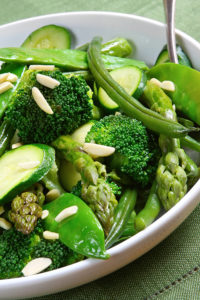Two of the most important but under appreciated nutrients to your health are vitamin K1 and K2. And of these  two it’s vitamin K2 that is the most important. So here’s a quick summary of vitamin K1 and K2 before we take a more in depth look at each of them.
two it’s vitamin K2 that is the most important. So here’s a quick summary of vitamin K1 and K2 before we take a more in depth look at each of them.
Vitamin K1 is crucial for proper blood clotting.
Vitamin K2 is key to preventing arterial calcification.
Statistically the higher your consumption of vitamin K2 the lower your risk for cardiovascular disease, cardiovascular calcification, and dying from cardiovascular disease.
What Are The Key Differences Between Vitamin K1 and K2?
A study was published in 2004 called the Rotterdam Study, which helped to highlight the key differences between vitamin K1 and K2. Here is a summary:
-
Vitamin K1 comes from plant sources like green, leafy vegetables (spinach, kale, broccoli, and cabbage.)
-
The absorption of vitamin K1 is extremely low. Only 10% is actually absorbed from your food source.
-
Most of your intake of vitamin K1 goes to your liver and stays there.
-
And vitamin K1 has a very short life span in the body. Usually after three or four hours the vitamin K1 from your food is gone.
-
Vitamin K2 is found in fermented foods through the production of this vitamin by certain bacteria.
-
While usually lower in amount almost all of the vitamin K2 is absorbed by your body.
-
And while vitamin K2 goes to the liver, the liver redistributes it through LDL cholesterol or low density lipoprotein.
-
Because of this enhanced distribution of vitamin K2, via your blood and it unique properties, it’s able to pick up excess calcium to prevent arterial calcification and return this calcium to your bones.
-
Vitamin K2 also improve vascular flow to your brain, which may help prevent cognitive diseases like Alzheimer’s.
As you can see the differences between vitamin K1 and K2 are significant. Especially as it applies to your cardiovascular health and proper blood flow.
Recommended Dosages for Vitamin K1 and K2
Out of the Rotterdam Study, and additional research in this area, the following dosages are recommended for these two vitamins.
For vitamin K1 it’s recommended that you consume at least 200 gram of vegetables per day.
Here are several foods that are high in vitamin K1 and represents the amount of vitamin K1 in 1 cup of the cooked vegetable:
-
Kale: 1,062 mcg
-
Collard greens: 1,059 mcg
-
Spinach: 889 mcg
-
Turnip greens: 529 mcg
-
Broccoli: 220 mcg
-
Brussels sprouts: 218 mcg
For vitamin K2 the current recommended dosage is 350 to 500 micrograms (mcg) per day. With a minimum of 45 mcg per day to prevent cardiovascular disease.
This minimum was established in the Rotterdam Study because people who consumed at least 45 mcg of vitamin K2 per day lived seven years longer than those who consumed 12 mcg per day.
Pretty significant.
The following list will provide several options that are good sources (3.5 ounces or 100 grams) for vitamin K2:
-
Natto: 1,062 mcg
-
Pork sausage: 383 mcg
-
Hard cheeses: 76 mcg
-
Pork chop (with bone): 75 mcg
-
Chicken (leg/thigh): 60 mcg
-
Soft cheeses: 57 mcg
-
Egg yolk: 32 mcg
While there could be more said about both vitamin K1 and K2, this article will give you an excellent starting point for including these vitamins into your diet.
Especially important is vitamin K2 to help improve your cardiovascular health.
Leave a Reply
You must be logged in to post a comment.